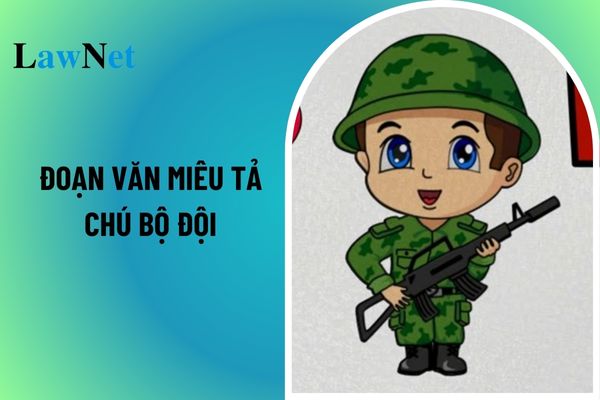What are the 07 sample descriptive paragraphs on soldiers? What learning outcomes are required for 5th-grade students regarding reading comprehension in the Vietnamese language curriculum?
What are the 07 sample descriptive paragraphs on soldiers in the 5th-grade Vietnamese Language curriculum?
Below are the 07 sample descriptive paragraphs on soldiers in the 5th-grade Vietnamese Language curriculum:
Paragraph 1
The soldier I met that day was truly tall and muscular. His dark green military uniform was neat and tidy, with a broad-brimmed hat on his head. His face was very kind, eyes bright and full of strength. He always smiled and talked friendly to everyone. I felt peace and assurance every time I looked at him.
Paragraph 2
The soldier looked very strong and muscular with a tall physique. His military uniform was always clean and pressed, matching his polished leather shoes. His sun-tanned face radiated strength and seriousness. His eyes gleamed with pride and patriotism. He was always eager to help others, instilling trust and assurance in those around him.
Paragraph 3
My soldier was tall and strong. His uniform fit well, neat and tidy. On his shoulder, he wore a rank insignia, symbolizing maturity and great responsibility. His face was bright, with eyes full of strength and decisiveness. He always wore a friendly smile, bringing a sense of warmth and closeness.
Paragraph 4
The soldier looked truly robust and strong. His dark green military uniform was always clean and pressed, accompanied by a broad-brimmed hat. His sun-tanned face exhibited the hardship and challenges of a soldier's life. His eyes shone with trust, resilience, and bravery. I always felt proud when I met him.
Paragraph 5
I greatly admire the soldier. His tall and muscular figure in the green military uniform. On his shoulder, he wore a rank insignia, proving that he was indeed a soldier. His face was determined but kind. His eyes always sparkled with determination and responsibility. He always instilled peace and trust in everyone.
Paragraph 6
The soldier I met that day was a truly respectable figure. His military uniform was always neat and clean. His sun-tanned face emanated strength and resolve. His eyes shone with pride in his profession and patriotism. He always treated everyone with care and friendliness.
Paragraph 7
My soldier has a tall, muscular build in a green military uniform. His sun-tanned face shows the hard life of a soldier. His eyes shine with trust and courage. Whenever he smiles, his whole face lights up, bringing a sense of warmth and closeness. He is a source of pride for me and for everyone.
Note: The above 07 sample paragraphs are for reference only!

What are the 07 sample descriptive paragraphs on soldiers in the 5th-grade Vietnamese Language curriculum? What learning outcomes are required for 5th-grade students regarding reading comprehension in the Vietnamese language curriculum? (Image from internet)
What learning outcomes are required for 5th-grade students regarding reading comprehension in the Vietnamese language curriculum?
Under the General Education Program for Literature, issued with Circular 32/2018/TT-BGDDT, the learning outcomes required for 5th-grade students regarding reading comprehension of literary texts in the Vietnamese language curriculum are stipulated as follows:
Reading comprehension of content
- Recognize some notable details and main content of the text. Understand the easily recognizable implicit content of the text.
- Identify the relationship between details. Be able to summarize the text.
- Understand the theme of the text.
Reading comprehension of form
- Recognize texts written from imagination and texts written about real people and events.
- Recognize time, place, and their effects in the story.
- Understand words, images, and methods of comparison and personification in the text.
Connection, Comparison, Linking
- Comment on time, place, appearance, and the character's personality through images in comics or animated films.
- Find an alternative ending to the story.
- Identify lessons learned from the story, poem, or play; select the most impactful aspect and explain why.
Expanded Reading
- During one academic year, read at least 35 literary texts (including texts guided for reading on the Internet) with genres and lengths equivalent to the texts studied.
- Memorize at least 10 - 12 poems, poem excerpts, or prose excerpts studied; each poem, excerpt, or prose about 100 words long.
What content does the 5th-grade Vietnamese Language curriculum include?
Under the General Education Program of Literature promulgated with Circular 32/2018/TT-BGDDT, the specific content of the 5th-grade Vietnamese Language curriculum includes:
- Rules for writing foreign personal names, geographical names
- Some cases of capitalizing common nouns to show special respect
- Vocabulary based on themes
- Dictionary: how to find words, meanings of words, how to use words, and search for other information
- Meanings of some easily understandable and common idioms
- Meanings of some common Sino-Vietnamese elements, “homophones with different meanings”
- Synonyms: characteristics and effects
- Polysemous words and meanings of polysemous words in texts.
- Pronouns and conjunctions: characteristics and functions
- Simple and compound sentences: characteristics and functions
- The use of dashes (in the middle of sentences to mark explanatory or descriptive parts); hyphens (to connect syllables in borrowed multi-syllable words)
- Rhetorical devices of word repetition and phrase repetition: characteristics and effects
- Linking sentences within a paragraph, some sentence-linking techniques and linking words: characteristics and effects
- Types and genres of texts
+ An essay rewritten based on a story ending
+ An essay describing a person or scenery
+ A paragraph showing feelings and emotions after an event, poem, or story
+ A paragraph expressing opinions about a social phenomenon
+ An essay explaining a natural phenomenon, introducing books or films, work reports, activity programs, using charts; advertisement texts (leaflets, posters,...)
- Information through images, data (non-verbal communication tools).

